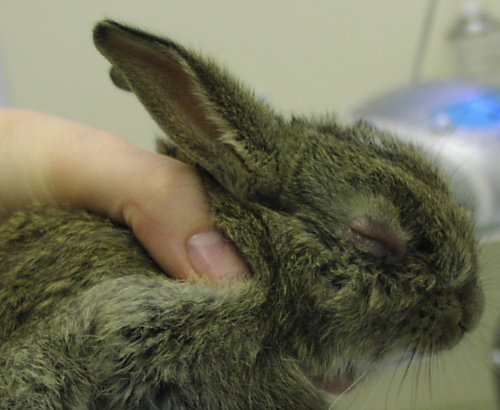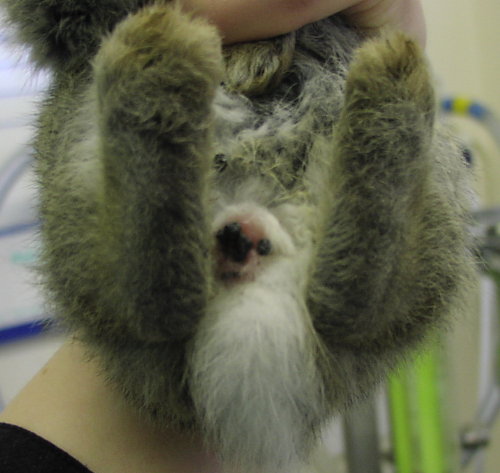Difference between revisions of "Clinical Case 3"
| (6 intermediate revisions by 2 users not shown) | |||
| Line 17: | Line 17: | ||
*There is obvious upper respiratory tract noise. The rabbit sounds snuffly. | *There is obvious upper respiratory tract noise. The rabbit sounds snuffly. | ||
| − | |||
| − | [[Image:Clinical Case 3 02.jpg|thumb|center|500px|(Courtesy of | + | |
| + | [[Image:Clinical Case 3 01.jpg|thumb|center|500px|(Courtesy of C. Antonczyk)]] | ||
| + | |||
| + | [[Image:Clinical Case 3 02.jpg|thumb|center|500px|(Courtesy of C. Antonczyk)]] | ||
| Line 32: | Line 34: | ||
How is it treated? | How is it treated? | ||
| − | *<font color="white"> Treatment of this condition is almost always pointless and would certainly not be attempted in a wild rabbit. Some owners insist on attempting treatment of pet rabbits. Rabbits will invariably stop eating and at this point require intensive nursing, including syringe feeding. Meloxicam, a non steroidal anti-inflammatory drug may be beneficial. In the authors experience, these owners usually come back to have their rabbit put to sleep and the time and effort they have put into nursing the rabbit makes this | + | *<font color="white"> Treatment of this condition is almost always pointless and would certainly not be attempted in a wild rabbit. This rabbit was euthanased. Some pet rabbit owners insist on attempting treatment of pet rabbits. Rabbits will invariably stop eating and at this point require intensive nursing, including syringe feeding. Meloxicam, a non steroidal anti-inflammatory drug may be beneficial. In the authors experience, these owners usually come back to have their rabbit put to sleep and the time and effort they have put into nursing the rabbit makes this decision all the more difficult. </font> |
The client who brought this rabbit to you has two pet rabbits at home. What do you recommend? | The client who brought this rabbit to you has two pet rabbits at home. What do you recommend? | ||
| − | *<font color="white"> The pet rabbits should be vaccinated. Myxomatosis is transmitted by fleas and mosquitos. Even indoor rabbits are not safe! The current vaccine provides cover for 6 months. If there is a lot of myxomatosis in the area, twice yearly vaccination is recommended. If the owner wants to vaccinate once a year, this is best done in May or June to provide best cover when myxomatosis is common during summer and autumn. Mosquito netting helps prevent infection and is especially useful if the rabbits are kept outdoors. </font> | + | *<font color="white"> The pet rabbits should be vaccinated. Myxomatosis is transmitted by fleas and mosquitos. Even indoor rabbits are not safe! The current vaccine provides best cover for 6 months (NobivacTM Myxo, Intervet UK Ltd). If there is a lot of myxomatosis in the area, twice yearly vaccination is recommended. If the owner wants to vaccinate once a year, this is best done in May or June to provide best cover when myxomatosis is common during summer and autumn. Rabbits are only fully protected two weeks after vaccination. Mosquito netting helps prevent infection and is especially useful if the rabbits are kept outdoors. </font> |
Is there a milder form of the disease? | Is there a milder form of the disease? | ||
*<font color="white"> Yes. It is seen in rabbits that have been previously vaccinated. Rabbits develop skin nodules. Treatment is worth attempting in these cases. </font> | *<font color="white"> Yes. It is seen in rabbits that have been previously vaccinated. Rabbits develop skin nodules. Treatment is worth attempting in these cases. </font> | ||
| − | <big><center>[[ | + | |
| + | To find out more click [[CCSA3|HERE]] | ||
| + | |||
| + | |||
| + | <big><center>[[Cases from General Practice - Small Animal|'''BACK TO CASES FROM GENERAL PRACTICE - SMALL ANIMAL''']]</center></big> | ||
| + | |||
| + | |||
| + | [[Category:Lost]] | ||
Latest revision as of 17:01, 24 February 2011
Courtesy of C. Antonczyk
History
A client brings in a wild rabbit that he found in his garden. He says that the rabbit did not make any effort to escape being caught.
Clinical Examination
On clinical examination, the vet finds the following:
- There is swelling around the eyes
- There is swelling of the genitals
- There is obvious upper respiratory tract noise. The rabbit sounds snuffly.
In order to reveal an answer, highlight the underlined or bulleted area using your mouse. The number of bullet points doesn't necessarily indicate a strict number of answers.
What is this condition?
- This rabbit has myxomatosis.
What is the cause?
- Myxomatosis is caused by a poxvirus.
How is it treated?
- Treatment of this condition is almost always pointless and would certainly not be attempted in a wild rabbit. This rabbit was euthanased. Some pet rabbit owners insist on attempting treatment of pet rabbits. Rabbits will invariably stop eating and at this point require intensive nursing, including syringe feeding. Meloxicam, a non steroidal anti-inflammatory drug may be beneficial. In the authors experience, these owners usually come back to have their rabbit put to sleep and the time and effort they have put into nursing the rabbit makes this decision all the more difficult.
The client who brought this rabbit to you has two pet rabbits at home. What do you recommend?
- The pet rabbits should be vaccinated. Myxomatosis is transmitted by fleas and mosquitos. Even indoor rabbits are not safe! The current vaccine provides best cover for 6 months (NobivacTM Myxo, Intervet UK Ltd). If there is a lot of myxomatosis in the area, twice yearly vaccination is recommended. If the owner wants to vaccinate once a year, this is best done in May or June to provide best cover when myxomatosis is common during summer and autumn. Rabbits are only fully protected two weeks after vaccination. Mosquito netting helps prevent infection and is especially useful if the rabbits are kept outdoors.
Is there a milder form of the disease?
- Yes. It is seen in rabbits that have been previously vaccinated. Rabbits develop skin nodules. Treatment is worth attempting in these cases.
To find out more click HERE

